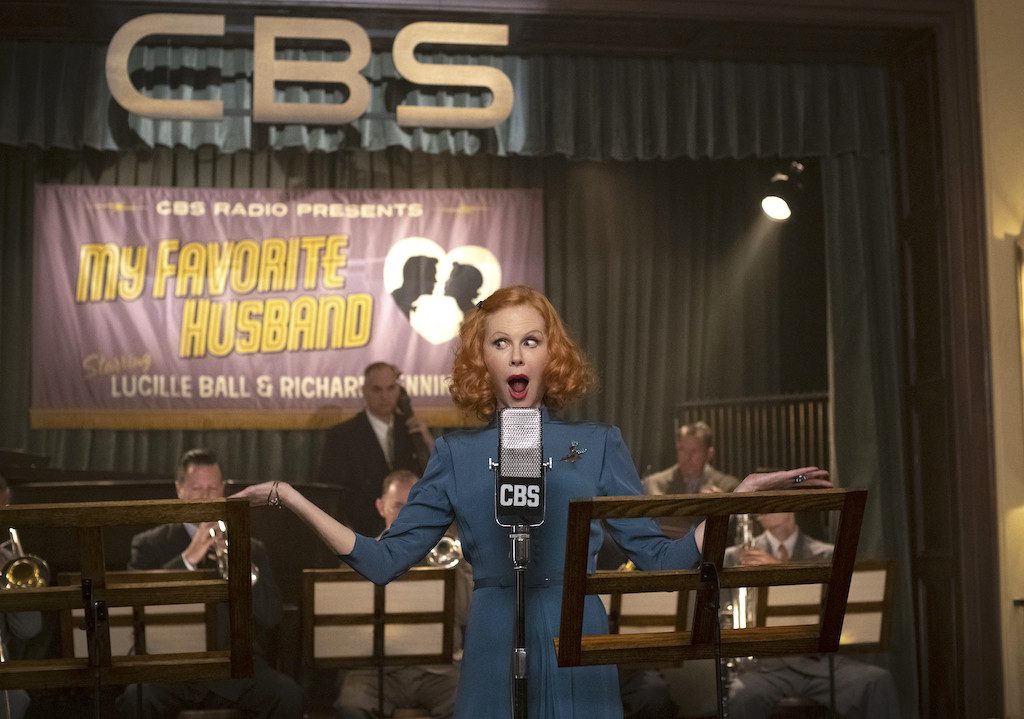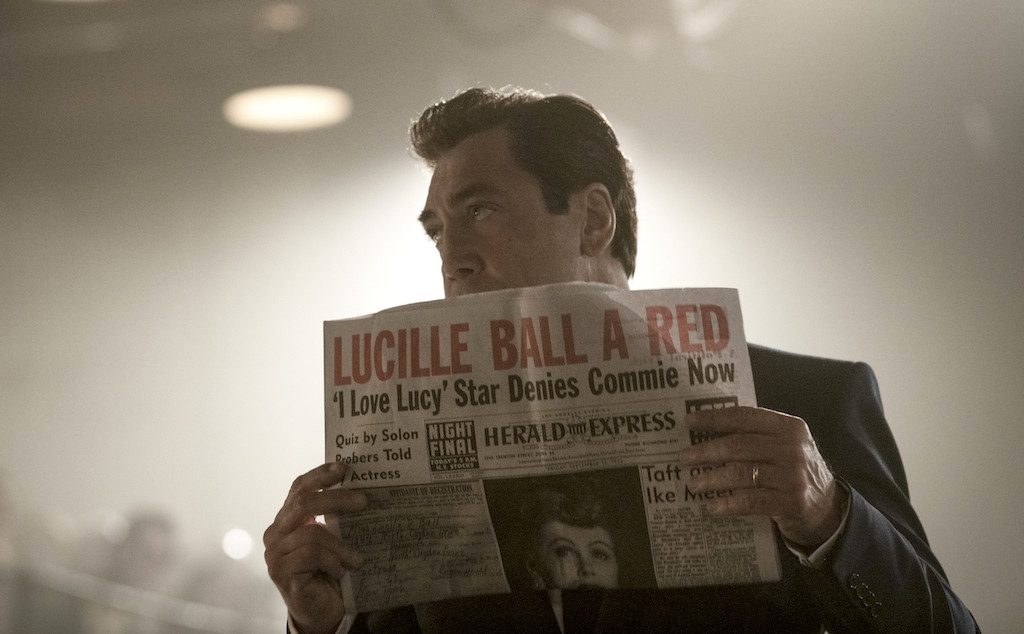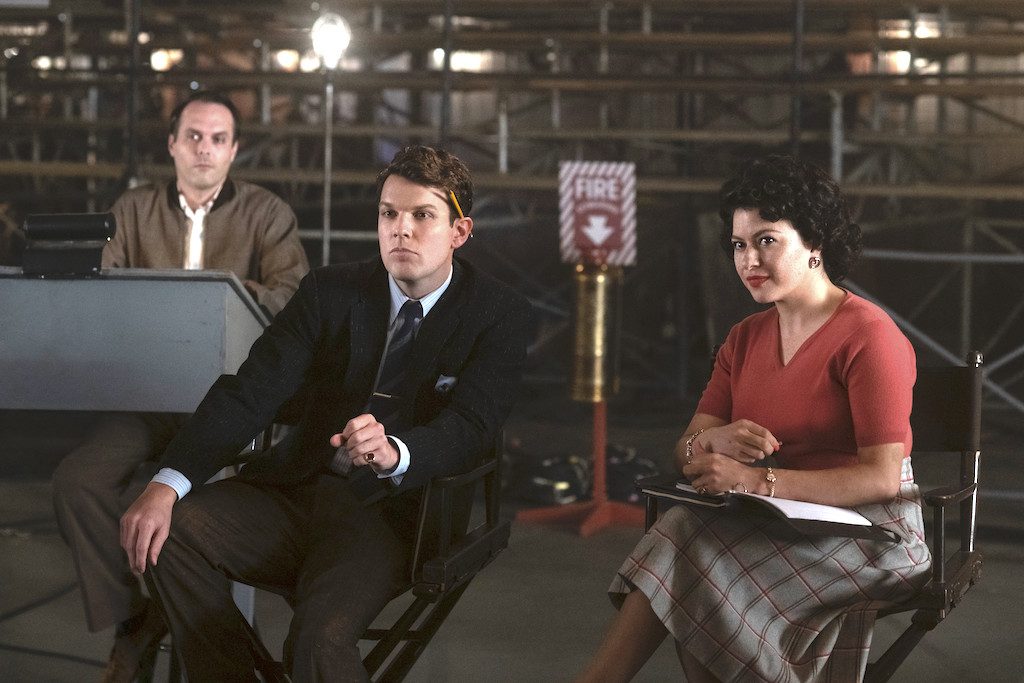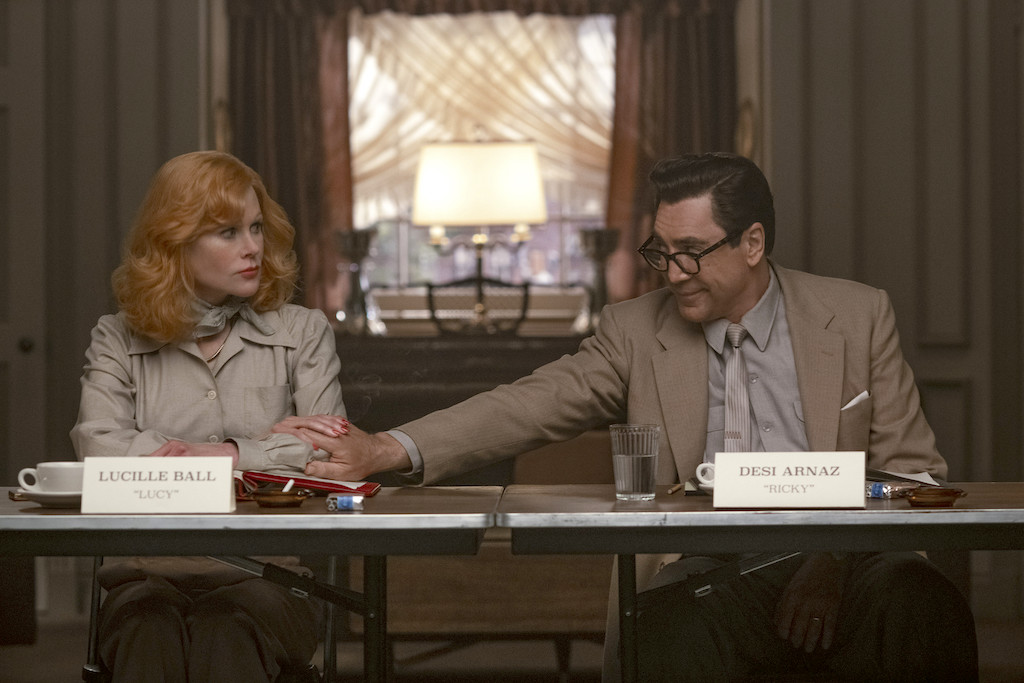Lucille Ball and Desi Arnaz were an iconic couple for decades, both on and off screen. Lucy and Ricky Ricardo were fictitious sitcom characters in I Love Lucy. Oftentimes, audiences chose not to distinguish the characters from the actual people.
Aaron Sorkin was charged with the task of telling the story of Ball and Arnaz in Being The Ricardos though the lens of the “making of I Love Lucy.” Aaron Sorkin didn’t want to pursue a standard ‘cradle to grave’ biopic format. Instead, he chose one week to cover three crucial events in their lives – Lucy being accused of being a Communist, Desi’s philandering, and Lucy’s pregnancy.
We asked him how it all began. “In 2015, producer Todd Black asked me if I wanted to write a film about Lucille Ball and Desi Arnaz,” said Sorkin. He also recalled it taking around 18 months before he even agreed to do it.
I like claustrophobic spaces and periods of time – Aaron Sorkin
Points Of Friction
Early on, Sorkin knew he decided to set the story during one production week (5 working days) of I Love Lucy. “During that 18 months, I collected points of friction, not only between Lucy (Nicole Kidman) and Desi (Javier Bardem), but also between Lucy and her best friend Vivian Vance (Nina Arianda), and Lucy and Jess Oppenheimer (Tony Hale), the Head Writer and Executive Producer of the show.”

Aaron Sorkin
Sorkin decided to showcase the Communist accusation as a key storyline. “That would be the ticking clock. Could they make it to Friday without I Love Lucy being cancelled by the network?”
On a more personal level, the screenwriter wanted to explore two people who very much loved each other, but couldn’t make their love work off-screen. “The lives of the characters they were playing were considerably more simple than their own lives.”
“Lucy yearned for domesticity. She said in the film, “I want a home and Desi home at dinnertime.” Desi grew up in a culture with a narrow definition of manhood. As much as he loved Lucy… he respected her, protected her, promoted her… but it was difficult for him to be faithful to her. He needed his escapes. These growing hairline fractures eventually doomed their relationship.”
Sorkin wanted to tell this story of drifting apart during Lucy’s pregnancy which should have brought them together. Despite relentless network pushback, Desi insisted Lucy’s baby was going to become a central part of I Love Lucy.

Lucille Ball (Nicole Kidman) Photo by Glen Wilson
As Aaron Sorkin collected these points of friction, “they started to feel like scenes with tension and obstacles.” This served as the preliminary structure of Being The Ricardos. The screenwriter confessed that the first draft of his screenplay was “pretty fat.” “I like to to keep writing until the end. Then, I go back and see what each scene is about and start cutting out the lines that aren’t about that, and keep those that are.”
Not A Biopic
Despite Sorkin’s insistence that Being The Ricardos isn’t a biopic, he concedes, that by default, any story about a real person is a biopic. “I feel that a biopic is a biography of a person… and this wasn’t what this was going to be.” The finished film essentially plays as a drama, peppered with elements of documentary and nostalgia. There were even recreations of famous scenes in I Love Lucy included. With respect to these scenes (filmed in black and white), “I didn’t want them to feel like we’re a cover band throwing the audience moments from their favorite episodes of I Love Lucy,” he said. Rather than paying homage to memorable scenes, such as Lucy’s grape-stomping escapade, “We were getting inside Lucy’s head to show she was the smartest and funniest person in the room.”
Lucille Ball’s comedic vision was also explored in the writers’ room, the read throughs, and the rehearsals where she could visualize every scene in its totality and how it would play to the audience on Friday. (I Love Lucy was filmed in front of a live audience).
The Communist scare, Lucy’s pregnancy and how it might affect production, and Desi featured on the cover of a tabloid magazine being intimate with another woman, actually happened over a three-year period. Compressing these events into a work week was a device for Aaron Sorkin to amplify the tension. “As a dramatist, you want to put as many formidable obstacles in front of them as you can and watch them overcome those obstacles.”
This on/off screen juxtaposition allowed the writer to contrast the idyllic lives of The Ricardos with the tumultuous lives of the Arnazes.

Desi Arnaz (Javier Bardem) Photo by Glen Wilson
During the writing process, Sorkin was faced with portraying the seismic contrasts between them. He was focused on drawing rich, complicated, and messy characters both on and off screen. “I was only interested in the actual people. Their legend, or public perception, would then take care of itself.” Sorkin wanted to tell a story about Lucille Ball and Desi Arnaz rather than Lucy and Ricky Ricardo. “I wanted to tell a story about real people, with real, complicated problems in a high stakes environment.”
Sorkin considers Lucille Ball and Desi Arnaz to be “very smart, very talented, and recognized each other’s talent on their first date. As a married couple, they had a difficult time getting it together.” This contrasts with the public’s commitment to the idea that they were also the perfect married couple in real life. “The public didn’t want to hear bad things about their marriage. They didn’t want to hear that Desi was cheating.” They had invested too much in their relationship to allow reality to tarnish it.
He didn’t want to portray Lucy and Desi as good or bad. Both were imperfect beings. Sorkin wanted to capture Lucille Ball’s wry sense of humor and her acerbic language and Desi Arnaz’s charisma and charm “making it impossible not to love him because he’s going to break our heart by the end of the movie.”
The writer explained the main difference between film and television at the time. “Television has a much more intimate relationship with its audience than cinema. It comes into your home… it’s something the whole family watche together. You want to spend time with these characters as if they’re your friends.”
Three Stories
The Red (Communist) Scare was ostensibly the story line with the highest stakes in Being The Ricardos. “The show could be cancelled and take down Lucy and Desi, along with everyone close to them.” This was the main narrative spine.
Lucy’s actual pregnancy was well-documented and subsequently occupied less screen time. Lucille and Desi were determined not to have Lucy wearing maternity clothes or have her stand behind objects to hide her baby bump in spite of the network’s vehement objections. “The network had already lost that argument. What choice did they have when Lucy could no longer hide her bump? They couldn’t take I Love Lucy off the air.”

Bob Carroll (Jake Lacy) & Madelyn Pugh (Alia Shawkat)
Desi’s infidelity occupied the least screen time, but also delivered the shortest, sharpest emotional jabs. Lucy was meant to accept that affairs never meant anything to her husband, despite her public proclamations to the contrary.
“The tabloid photo of Desi and another woman gave a sense of how the movie might end so I could write towards that. But it was a bit of misdirection. By the end of the movie, we had to feel that only problem was the Communist scare.” This sets up the Ricardos for a happy romantic ending. Head of FBI, J. Edgar Hoover calls Lucy while they’re filming, to tell her she’s no longer considered a threat the American way life. This would seem a veritable moment of relief.
Lucille Ball rapidly pivots from “I love you” to “have you been cheating on me?” much to Desi Arnaz’s discomfort. Aaron Sorkin intuitively felt his way through the timing and weaving process of these storylines. “If we spent too much time away from a particular story, I went back to it.”
Being The Ricardos is arguably a 5 act story. Each day of the work week included a flashback scene and scenes with older versions of the three writers in an interview – Jess Oppenheimer (John Rubinstein), Madelyn Pugh (Linda Lavin), and Bob Carroll (Ronny Cox).
Aaron Sorkin admits to “climbing the walls” to finesse his story. “I drive around, listen to music, and talk to myself. Sometimes I start an argument.”
““Lucy, I’m Home” is arguably the most iconic line of dialogue in the show to define Lucy’s innermost desires. It wasn’t fame, fortune, or success. It was a nice family life. Success was the garnish.
When evaluating his writing process, Aaron Sorkin looks at other films and questions what he most responds to, what he likes and dislikes – especially what he dislikes. “I really try to figure out what didn’t work to guide my writing.“
